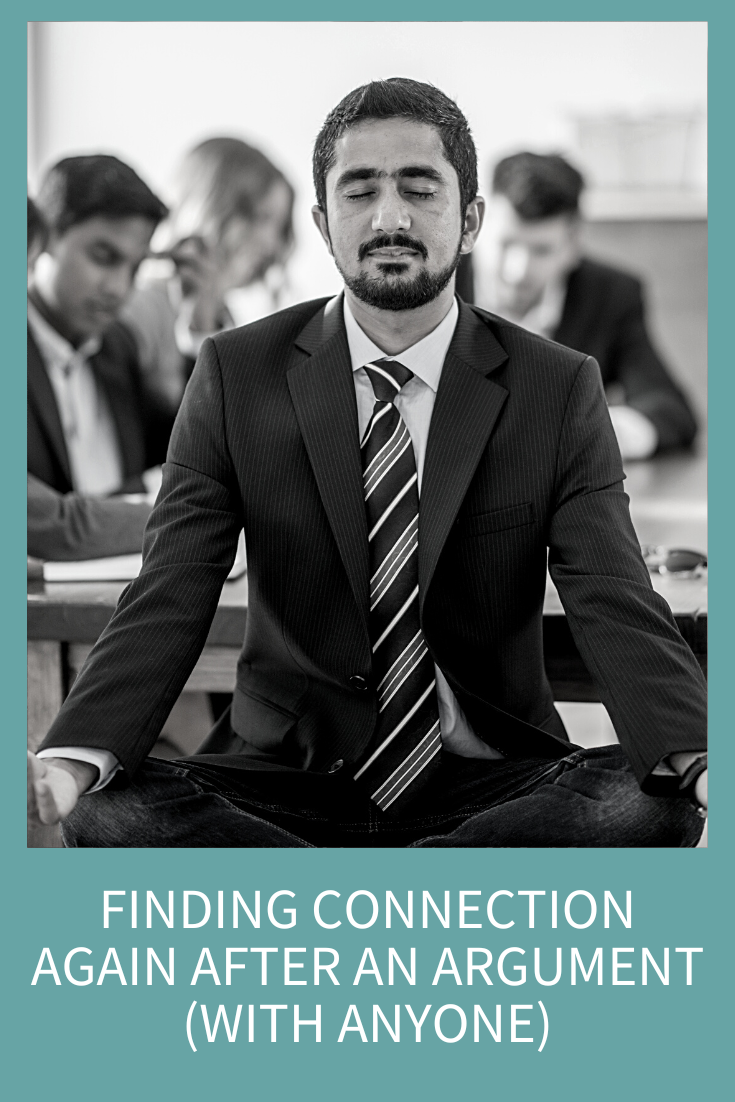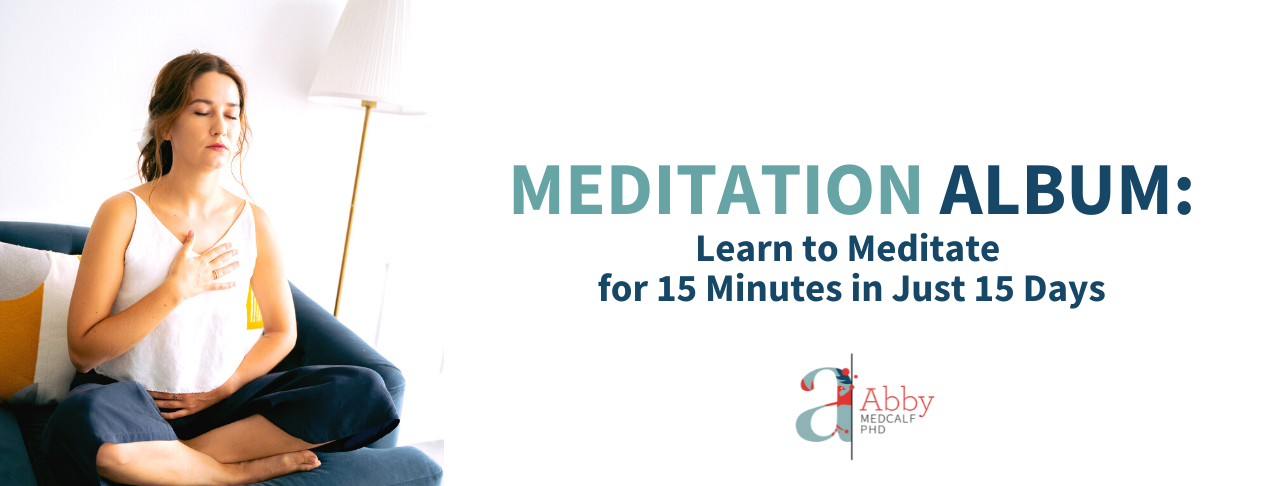
Even if you use all the great tools I’ve taught you in the last 200 episodes during an argument, you might still have trouble reconnecting after an argument. When our feelings have been hurt, it can be hard to come back to feeling “normal” with this person again. Our rational minds tell us that it’s time to reconnect, but we just can’t seem to find the motivation or tools to make it happen. Today I’m sharing the one thing you need to do to reconnect and my best tools to make that happen!
9-minute read
Today’s post was inspired by someone who wrote in and asked:
“What advice do you have for after a fight or an argument? Like the next morning when it’s full of tension and awkwardness, and although the fight may be over, that lingering pit is not. I guess I’m asking about fight hangovers, lol. Is there a best way to approach this?”
We’ve all been there. After the big fight with your partner, you say everything is fine as you go out to dinner, but you can’t seem to put your emotional wall down. You’re back at work after a blowout and reconciliation with your boss, but you can cut the tension with a knife. You and your dad both apologized for that big argument last week, but it still feels awkward between the two of you at lunch today.
What do you do when you’ve gotten through the argument, but you’re still dealing with your fight hangover?
The answer is to focus on getting yourself into a good-feeling place before you try to reconnect with the other person.
The big mistake people make the day after an argument is that they try to reconnect with the other person from a fear-based place, and real connection can only happen from a love-based place.
Think about how you feel after an argument. Even if you believe things were mostly resolved (if you don’t think things got resolved, you need to check out last week’s episode), you’re still likely feeling exhausted, sad, overwhelmed, worried, disconnected, and anxious. If you don’t feel like there was a good resolution after your fight, you’re feeling even worse, so you also might be feeling frustrated, resentful, depressed, angry, helpless, or hopeless. Maybe you’re even feeling unsafe and unworthy of love!
When you’re experiencing these kinds of emotions, no matter what words you use, the other person is picking up on your doubt, anxiety, and upset. The goal is to get yourself into a better-feeling state where you’re experiencing more calm and equanimity. Once you’re there, the anxiety and unwanted feelings will fall away as you move toward the other person with an open heart.
So, you’re ready to get yourself into a loving, healthy state, but how exactly do you make that happen? By using one or more of these tools, of course:
Tool #1: Meditation
I’ve already explained in depth how just 15 minutes of meditation a day will change your life. So, I’ll just say here that it’s the very best thing you can do to work on finding inner stillness and peace. Meditation will help calm your nervous system and help you regulate your emotions. This helps to unhook whatever might have been triggered in the argument and bring you back to remembering that you are safe. From this place, connection is a done deal.
I’ve got a free meditation starter kit you can try, or my program for how to meditate for 15 minutes in just 15 days, and/or a free loving kindness meditation that you can use to help you cultivate love for yourself and the other person. Try one or all but get to meditating!
Tool #2: Pray
If praying is something you like to do, there’s no better time than now. Ask God, Allah, the Universe, Source, or whatever you believe in to help you reconnect to yourself and this moment. Ask for help in moving past your fear and ego so you can reach out with love and an open heart.
Tool #3: Move Your Ass
Movement is a great way to change your head space. You can go for a walk in nature, run on a treadmill, dance alone in your bedroom to a happy song at full blast, or try a yoga class. Any movement will help you get out of your head and help your body burn up those stress hormones that are flying around after an argument.
Tool #4: Appreciate and Calibrate
Appreciation is a great way to activate the love-based side of your brain while turning down the volume on any fear you’re having. There are a few easy ways to do this.
First, you can simply write out a list of all the things you appreciate in your life. This does not need to be about the person you argued with. Simply getting into an active state of appreciation is the key to changing your attitude and brain chemistry.
Second, you can sit quietly with your eyes closed and think of a situation where you feel deep appreciation. It could be remembering the first time your child said “mama” or the first time your partner said, “I love you.” It could be remembering a time you got an award or buying that cool new car you love driving. It doesn’t matter how big or small the thing is; simply close your eyes and put yourself in “state.” That means you’re actively picturing yourself in the situation and engaging all five senses. Play it like a movie in your head with all the sounds, sights, and feelings you had when it happened.
Third, you can actively calibrate your energy to a higher vibration. Your body is comprised of matter (or mass) and energy, neither of which can be destroyed. The first Law of Thermodynamics says that energy can be changed from one form or another, but it can’t be created or destroyed. The energy we’re talking about here in your body is electrical signals and impulses and your chemical reactions. In fact, at any given time, you’re putting out about 20 watts of energy, which is enough to power a light bulb!
The universe is a closed system but ecosystems, like your body, are open systems. Because we’re an open system, we’re always exchanging energy with our environment. You can therefore gain energy or lose it by how you’re interacting with yourself and your environment.
What happens in your day is that you start to calibrate to other people and situations. The goal is for you to be the dominant (positive) vibration in the room. Instead of calibrating to others, which is a fear-based model (people pleasing, codependency, low self-esteem, no self-confidence, self-consciousness), you have others calibrate to a positive state with you.
When you’ve calibrated yourself to a higher vibration (such as compassion, patience, kindness, or love) and then walk up to your partner, they’re absolutely going to pick up on your energy, and you’ll have an easier time connecting and bringing them to where you are emotionally.
If you want to change your calibration right now, listen to my free calibration exercise.
Fourth, I’ve done a complete episode about a tool I love called the next best feeling thought. You should absolutely check it out, but it’s basically a written exercise that helps you move from feeling bad about something to feeling much better about it. It’s an effective way to move up the emotional ladder so you can feel better in a moment.
When I’m doing the “next best feeling thought” exercise, I get out a piece of paper and write it out. Basically, I start with my feeling goal and then write down the next best-feeling thought I can believe. And then I write the next and the next until I feel better.
The key is to start as general in your thoughts as you need, and then you can gradually become more specific. You can’t get from shitty to giddy, so you take one small step up the ladder at a time.
- I like knowing that everything is figure-out-able
- I’ve always been able to count on myself to find solutions
- I’ve come a long way in my life – there are things to be proud of
- I’m responsible for my life
- I’ve co-created all my relationships
- I’ve co-created this relationship with my partner to where it is now
- That means I can co-create this relationship to where I want it to be by focusing on my own actions
Tool #5: Try RET
Last but not least is my old favorite, Rational Emotive Therapy or RET. Once again, it’s such an amazing tool that I did a whole episode about it! Albert Ellis, considered by many to be the grandfather of cognitive-behavioral therapies, founded Rational Emotive Therapy (RET) in 1955. His theory was revolutionary at the time (and maybe to you now) because it centered around the idea that individuals tend to think that what other people do causes our feelings. But, what really “makes us” angry, sad, or glad is thinking angrily, sadly, or gladly about things that happen to us. In other words, what we think or tell ourselves about an event makes us feel something, not the event itself.
I say a lot, “You feel the way you think,” and this is a direct quote from Ellis’ teachings. RET helps you identify self-defeating thoughts and challenge them. You can then replace these thoughts and beliefs with new healthier ones. This results in moving our feelings from destructive or negative ones to a positive, more productive emotional state. Once again, when you’re in a healthier emotional state, reconnecting with anyone else after an argument becomes so much easier.
Once you’ve gotten yourself into that good state of being where you’re feeling compassion and kindness towards the other person, I recommend reaching out to the other person first. Don’t wait on them to come to you. Seek them out and speak to what’s happening in the here and now.
If it’s someone at work, you might approach them and say, “I don’t want to feel uncomfortable with you. I’ve spent some time getting clear with myself, and I want you to know that I respect our relationship and that I appreciate our working relationship. I’m excited for us to communicate easier moving forward.”
If it’s your partner, you might say, “Good morning. I’m starting today fresh and just made a list of all the things I appreciate about you. I love you, and I’m looking forward to us getting better and better at communicating.”
Whoever it is, don’t wait. Reach out and let them know that you love them or appreciate them or whatever is real for you. Set an intention, out loud, for how you’d like to be with them moving forward. As you show them that you’re looking forward to your relationship growing, they’ll feel your sincerity and act in kind.
Resources for Reconnecting After an Argument
Rational Emotive Therapy (RET) Tool
How to Resolve an Argument That Didn’t Get Resolved the First Time
How Meditation Benefits Your Relationships (and There’s an Easy Way to Learn)
Meditation Album: Learn to Meditate for 15 Minutes in Just 15 Days
The Secret to Positive Thinking in All Your Relationships
Calibration Exercise: Create a Positive Vibration to Start Your Day
The Easiest and Most Effective Way to Solve Any Problem
Change How You Feel with this Easy Tool
How Setting an Intention Will Change Your Life
Research for Reconnecting After an Argument







